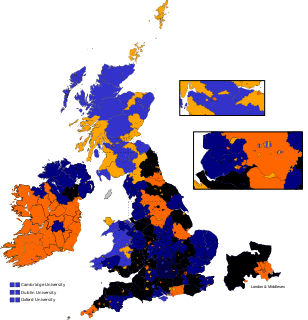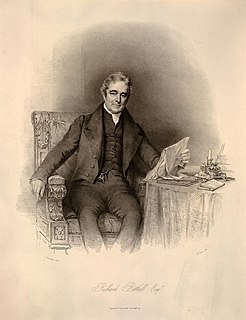Related Research Articles

Bridgwater was a parliamentary constituency represented in the House of Commons of the Parliament of the United Kingdom, until 2010 when it was replaced by the Bridgwater and West Somerset constituency. It elected one Member of Parliament (MP) by the first past the post system of election.
Warwick was a parliamentary borough consisting of the town of Warwick, within the larger Warwickshire constituency of England. It returned two Members of Parliament (MPs) to the House of Commons of England from 1295 to 1707, to the House of Commons of Great Britain from 1707 to 1800, and then to the House of Commons of the Parliament of the United Kingdom until 1885.

Sir Edward Knatchbull, 9th Baronet, was a British Tory politician. He held office under Sir Robert Peel as Paymaster of the Forces between 1834 and 1835 and as Paymaster-General between 1841 and 1845.
Bradford was a parliamentary constituency in Bradford, in the West Riding of Yorkshire.
Rochester was a parliamentary constituency in Kent. It returned two members of parliament (MPs) to the House of Commons of England from 1295 to 1707, then to the House of Commons of Great Britain from 1708 to 1800, and finally to the House of Commons of the Parliament of the United Kingdom from 1801 until the 1885 general election, when its representation was reduced to one seat.
Cricklade was a parliamentary constituency named after the town of Cricklade in Wiltshire.
Penryn and Falmouth was the name of a constituency in Cornwall, England, UK, represented in the House of Commons of the Parliament of the United Kingdom from 1832 until 1950. From 1832 to 1918 it was a parliamentary borough, initially returning two Members of Parliament (MPs), elected by the bloc vote system.
Kingston upon Hull, often simply referred to as Hull, was a parliamentary constituency in Yorkshire, electing two members of parliament to the House of Commons of the Parliament of the United Kingdom, from 1305 until 1885. Its MPs included the anti-slavery campaigner, William Wilberforce, and the poet Andrew Marvell.

Tower Hamlets was a parliamentary borough (constituency) in Middlesex, England from 1832 to 1885. It elected two Members of Parliament (MPs) to the House of Commons of the Parliament of the United Kingdom. It was one of the first five of its type in the metropolitan area of London. It was enfranchised by the Reform Act 1832.
Wareham was a parliamentary borough in Dorset, which elected two Members of Parliament (MPs) to the House of Commons from 1302 until 1832, and then one member from 1832 until 1885, when the borough was abolished.
Sandwich was a parliamentary constituency in Kent, which elected two Members of Parliament (MPs) to the House of Commons from 1366 until 1885, when it was disfranchised for corruption.

The Honourable Edward Harbottle Grimston was an English amateur cricketer and a Conservative Party politician who held a seat in the House of Commons from 1835 to 1841.
Spencer Horsey de Horsey, known until 1832 as Spencer Horsey Kilderbee, was a British Tory politician. He sat in the House of Commons between 1829 and 1841.
Thomas Matthias Weguelin was an English Liberal Party politician who sat in the House of Commons between 1857 and 1880.
Lancelot Rolleston was a British Conservative Party politician.

Robert Aglionby Slaney was a British barrister and Whig politician from Shropshire. He sat in the House of Commons as a Member of Parliament for the borough of Shrewsbury for most of the period from 1826 until his death in 1862.

Sir James Duke, 1st Baronet was a British Liberal Party politician. He was Lord Mayor of London in 1848–1849, and sat in the House of Commons from 1837 to 1865.
James Pattison was a Liberal Party politician in England. He sat in the House of Commons between 1835 and 1849.

Richard Bethell was a British Tory and then Conservative Party politician from Rise in the East Riding of Yorkshire. He sat in the House of Commons between 1830 and 1841.
Alexander Murray of Broughton was a Scottish Liberal Party politician who sat in the House of Commons of the United Kingdom from 1838 to 1845.
References
- ↑ "Constituencies beginning with "M" (part 1)". Leigh Rayment's Historical List of MPs. 23 June 2018. Archived from the original on 2 July 2018. Retrieved 24 February 2019.
{{cite web}}: CS1 maint: unfit URL (link) - ↑ "No. 19533". The London Gazette . 18 August 1837. p. 2182.
- 1 2 3 Craig, F. W. S. (1989) [1977]. British parliamentary election results 1832–1885 (2nd ed.). Chichester: Parliamentary Research Services. p. 198. ISBN 0-900178-26-4.
- ↑ "No. 20001". The London Gazette . 23 July 1841. p. 1926.